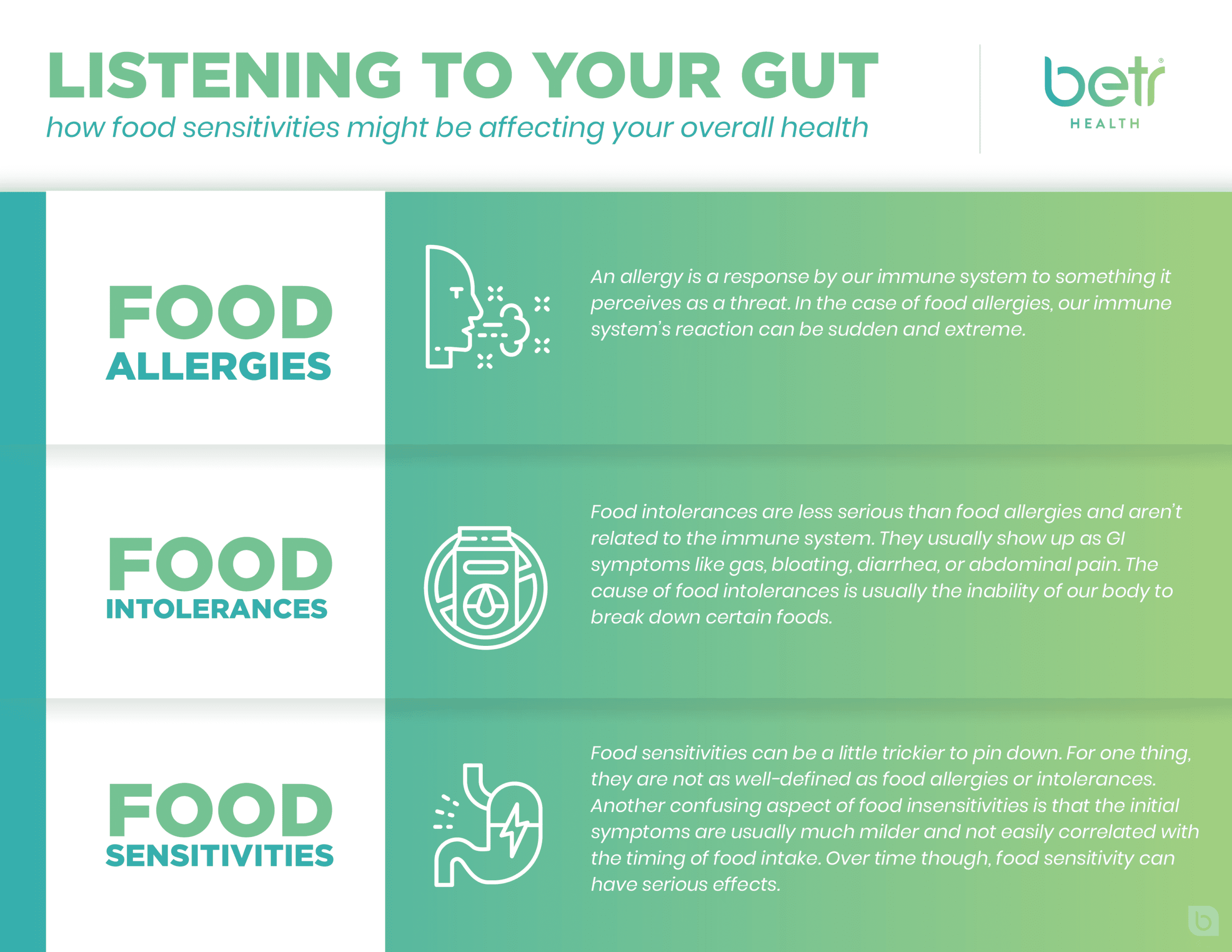We may not realize it, but our gastrointestinal tract (our “gut”) is a complex and fascinating system.
Our gut contains 70-80% of our immune system and, in terms of surface area, it’s the part of our body with the most contact with the outside world.
Most of our gut’s interaction with the outside world comes from the food and drink we ingest.
Our digestive system’s main role is breaking food down into the nutrients necessary for healthy functioning.
But there are times when the food we take in for fuel causes unintended effects in our body.
Some of these can be dramatic, such as a severe allergic reaction to shellfish; others are uncomfortable or inconvenient, such as bloating and gassiness from a large serving of dairy.
Some of these reactions, though, are less obvious but result in chronic and wide-ranging health effects.
These reactions are known as “food sensitivities”.
What is “food sensitivity"?
The easiest way to explain what a food sensitivity is might be to begin by explaining what it is not.
When we talk about reactions to food, there are three main categories: food allergies, food intolerances, and food sensitivities.
The easiest food reaction to recognize is a true food allergy.
An allergy is a response by our immune system to something it perceives as a threat.
In the case of food allergies, our immune system’s reaction can be sudden and extreme.
Severe allergic reactions, called anaphylaxis, may involve swelling of the face, lips, or throat and a sudden drop in blood pressure, and usually require immediate medical attention.
Less dramatic allergic reactions may cause a rash or hives over a large area of the body.
Common foods that can cause these reactions are nuts, shellfish, and eggs.
Allergens can often be identified by a specialized physician using a “skin-prick” or blood tests.
Food intolerances are less serious than food allergies and aren’t related to the immune system.
They usually show up as GI symptoms like gas, bloating, diarrhea, or abdominal pain.
The cause of food intolerances is usually the inability of our body to break down certain foods.
They can be genetic, age-related, or even linked to periods of high stress or trauma.
Some food intolerances can be treated with supplements or medication.
For example, the inability to digest dairy, a commonly known food intolerance known as “Lactose Intolerance”, can be treated with a supplemental digestive enzyme known as “Lactase”.
Often people will use the term “allergy” when describing a food intolerance, but it’s important to understand that they are distinct issues.
Allergies are caused by an overactive immune system, while food intolerances are caused by digestive disorders.
Food sensitivities can be a little trickier to pin down.
For one thing, they are not as well-defined as food allergies or intolerances.
Another confusing aspect of food sensitivities is that the initial symptoms are usually much milder and not easily correlated with the timing of food intake.
Over time though, a food sensitivity can have serious effects.
The primary theory of food sensitivities is they are caused by tiny immune system reactions within the gut.
These aren’t the big, overwhelming kind of immune reaction associated with an allergy, but reactions that take place at a cellular level.
Cells in our gut react to certain molecular structures in foods and release chemicals that cause inflammation.
If food is eaten in small amounts or infrequently, we may not experience any noticeable effects from these reactions.
However, if these foods are eaten regularly, these tiny inflammatory reactions and the chemicals they produce build up and can cause chronic effects in other parts of our body.
These effects can be far-ranging and affect virtually any part of our health.
While many food sensitivities can cause obvious effects like stomach pain or other digestive issues, they can also cause eczema or skin rashes, chronic joint pain, fatigue, and even “brain fog”.
Another challenge of food sensitivity is that, because they often go unrecognized and are poorly understood, individuals might struggle to get an appropriate diagnosis and relief from these symptoms.
Ok, maybe I have a food sensitivity...what do I do about it?
Unfortunately, there aren’t medications for the treatment of food sensitivities.
There are some tests that may identify food sensitivities, but the most effective treatment is to identify the trigger food that may be causing symptoms.
A trigger food is the food or group of foods that you are sensitive to.
They are the cause of your food sensitivity.
But we’ve already said that it’s difficult to track which symptoms are caused by which foods, right?
The best approach to treating food sensitivity is an elimination and reintroduction diet.
This involves removing foods that you might be sensitive to, then reintroducing these foods individually to identify the specific food causing symptoms related to your sensitivity.
When food is reintroduced, and you experience a return of symptoms, we can identify it as a trigger food.
Successful identification and elimination of your trigger foods can result in relief from symptoms you may never have associated with your dietary habits.
Identifying your specific trigger food is a challenging task and you will likely need the support of a dietary expert to guide you through the process.
Here is where Betr is designed to help you achieve long term success.
A Betr coach will provide you with support and guidance during the elimination and, if you choose, the reintroduction phase.
Betr can help you design healthy and satisfying nutritional habits while identifying and eliminating your trigger foods, leading to improved overall health and quality of life.
Food sensitivities are a challenging issue to recognize and manage.
Specialized training is often needed to recognize the signs and symptoms of food sensitivity.
The Betr team is trained in the identification of food sensitivities and helping you to manage them through improved nutrition.







This Post Has 5 Comments
Listening to your gut is very interesting I do not have any food allergies and intolerances but I believe I have at lleast one sensitivity. I have several very dry patches on my legs i.e. two on leg and one on the other.
Great information. Will be more attentive to how my body reacts to the foods I partake of.
This is really alot of great information, makes you realize how important it is to pay attention to what we put in our bodies cause it really does effect our health.
This is very informative. I will use this time to identify what food intolerances and sensitivities I have.
Gee, all this is very interesting. I have never ever thought about this before to do with food. My husband and children all have asthma. My husband passed away due to heart attack at 73. But my oldest daughter tells me suddenly she noticed she is allergic to peanuts and other things she is 60 years old.
I think this class I am taking with you is fascinating. Wish I learned about all of this many years ago. I am 83 but I find this very interesting. Thankyou for all you do.
I had a Skin Drs appt today. I stopped by the store and bought a lot of the food on the food #1 list. I have some good ideas of what I want to make. I am drinking bottles of water I have on hand. I live in a house with well water. It is delicious. It is high in iron and makes my driveway stained light brown. I understand it is good water. Possibly from Mt Shasta? My neighbors think it is. I have been drinking bottles of water because it is convenient but I will drink my own well water for now on after reading your article. Thankyou for all you do and I am so glad I have this opportunity to experience this. Have a great day, Carol Henderson